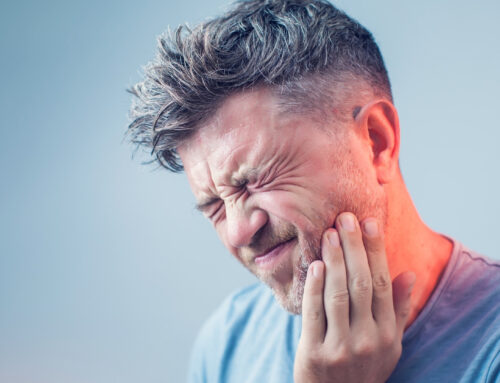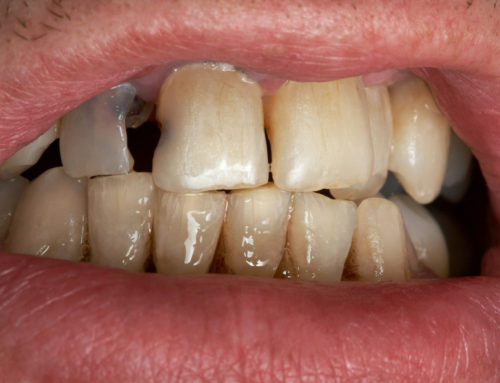It’s a sitcom trope: A character spends the whole episode avoiding addressing a toothache, only to wind up wrapped in gauze and miserable in the end. Don’t be like that character. Tooth pain and other oral health issues shouldn’t be ignored, and certainly aren’t very funny!
The following issues may seem easy to overlook, but they are signs of problems that, if left untreated, could get much worse. These problems can be prevented or minimized by visiting your dentist for routine checkups and cleanings.
Tooth sensitivity
Does taking a bite of your favorite ice cream cause a sharp blast of pain? What about a hot cup of coffee? If hot, cold, sweet, or acidic foods cause tooth pain, or even if the act of brushing your teeth hurts, you have tooth sensitivity.
Tooth sensitivity is an indicator that the tooth’s protection mechanisms aren’t working properly. A healthy tooth has a coat of enamel protecting the sensitive dentin, and the gums protect the tooth’s roots. If the enamel has worn thin or gum recession exposes the roots, get ready for pain.
Several issues contribute to tooth sensitivity, including brushing too hard, poor oral hygiene, teeth grinding, over-whitening, plaque buildup, and gum disease. A dentist will determine the cause and prescribe the appropriate treatment to alleviate pain. Treatments range from desensitizing toothpaste to surgical treatments.
Jaw pain
If you wake up with a sore jaw, you may be grinding your teeth in your sleep. Bruxism—or teeth grinding—can cause major damage if it occurs regularly and is left untreated. Chronically grinding your teeth leads to loosening, fracturing, and even losing teeth. It can be hard to know if you’re grinding your teeth in your sleep, but jaw pain or tenderness is a strong indicator. Having your dentist fit you for a mouth guard worn at bedtime can prevent further damage.
Jaw pain is also a symptom of toothache, usually caused by a cavity or an abscess. The pain from the problem area can radiate into the jaw and beyond to other parts of the body like the sinuses and ears. If you have a tooth causing you problems, see your dentist right away—especially if the pain is spreading.
Swollen or bleeding gums
Teeth aren’t the only indicators of your oral health. Your gums are a huge part of not only your dental health but also your overall health. Swollen and bleeding gums are an indicator of gum disease.
If you don’t practice proper oral hygiene, bacteria form plaque on the teeth that inflame the gums. Gingivitis is the less severe form of gum disease and is reversible with proper oral hygiene. If left untreated, gingivitis will escalate to periodontitis and, ultimately, tooth loss.
When you visit the dentist regularly, they’ll spot problem areas to address, demonstrate proper brushing and flossing techniques, and recommend products to help reduce gum inflammation.
Dry mouth
Beyond being uncomfortable, dry mouth can cause problems for your teeth. Our mouths rely on saliva to wash food and bacteria from our enamel. Left untreated, dry mouth can cause tooth decay.
A dry mouth is usually a symptom of another issue stemming from a medical issue, medications, or dehydration. Your dentist can help determine the cause and recommend a plan to treat your other medical issues and alleviate dry mouth.
Bad breath
Bad breath is more than an embarrassing social condition; it’s a sign something is wrong with your health. Poor oral hygiene is a sure cause of stinky breath. Regular brushing and flossing remove bacteria, leaving your mouth nice and clean.
Bad breath could stem from issues discussed above, like gum disease or dry mouth. It could also indicate a poor-fitting dental device or an infection like thrush. Sometimes, it even signals a gastrointestinal issue like acid reflux.
If you’re self-conscious about your bad breath, a dentist can help you determine the cause and treatment plan before it gets worse.
Speak up
If you’re experiencing any of these symptoms or other changes in your oral health, speak up! Resolving an issue before it gets worse is always the best course of action for oral health.
Routine check-ups and cleanings are the best defense against oral health issues. If you suspect a problem, even if it seems small, book an appointment with your dentist as soon as possible. You’ll get the relief you need and avoid bigger, costlier problems down the line. Instead of being the comic sitcom character with a toothache, you’ll be the one flashing a pearly white smile!







Leave A Comment